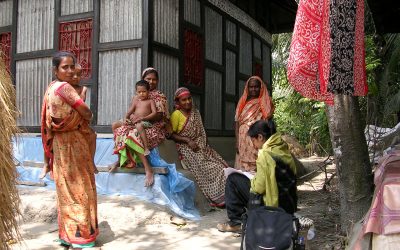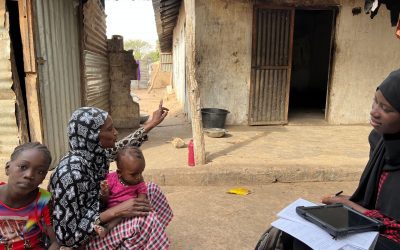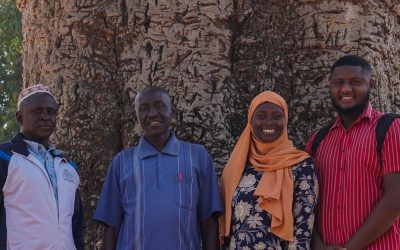Kinship and religion: How religion improves relationships with relatives
By Robert Lynch
My grandparents were Mennonite farmers from the Ukraine. They emigrated to Canada when they were 11 and 12 years old, shortly after the Ukrainian famine of 1921-1922, during which they survived on the straw from the roofs of their houses. My mother was raised on their farm in Canada with her four siblings. She went to a Mennonite school with only 25 other children in her grade level until she graduated high school. The women in each grade were organized into quilting circles called ‘Varanes’ which become the central hubs of their social networks for the rest of their lives. Life on the farm is a solitary existence, especially for women, and these groups offer an important form of social support connecting women to the larger community in intimate ways that evolved over time. At funerals, for example, each Varane is charged with a specific task such as cooking, providing the pastries, or serving coffee. The Mennonites in Leamington, Ontario are an extraordinarily religious and family focused community. They all attend the same church and most of the older generation end up in the same retirement home, where they all either speak German or a Mennonite derivative called Plattdeutsch.
My mother was the only one of 5 siblings who moved away from this insular community when she married my father, a Scotch-Irish American. Although my sister and I were raised across the border from this rural community in neighboring Detroit, we spent most of our summers and holidays with my Canadian relatives. When I was young, I assumed that this was how all kids grew up—that everyone had a lot of cousins who they saw all the time. From a young age I learned the difference between 1st, 2nd and even 3rd cousins, what ‘once removed’ meant, and other kinship terminology that would serve me well later when I became an anthropologist. By the time I left for college, however, I had put this idyllic family-centered childhood behind me and saw my cousins less often. After moving to New York City and living in different Nordic countries over the next several decades, I lost touch with most of my extended family, and any interaction with them was restricted to asking my mom how my Aunt Agnes or my cousin Roy were doing when I came back to Detroit. My only connections to them now are nostalgic childhood memories of running around on the farm, discussions with my 80-year-old mother, and reading about the ‘Mennonites’ on Wikipedia. I have lost both my religious beliefs and any connection with my extended family. Eventually I became an anthropologist and as the bonds with my cousins faded, I replaced them with more ephemeral links all over the world, substituting a strong kin-based social network with a much larger, but far weaker network of colleagues and occasional friends.
The transition from my mother growing up in a highly religious, family-centered, farming community to my secular, ‘citizen of the world’, urban experience is a microcosm of globalization – a multi-generational story that has happened to hundreds of millions of families across the world. Religion, kin networks and urbanization are connected in complex and intricate ways, and globalization has had some of the deepest and most rapid effects on social relationships the world has ever seen. Human social life has been centered around kinship for most of our history, but this foundation began to change as humans made the transition from agricultural to market-based economies. As people move away from their families in search of jobs, social organizations previously structured around families become increasingly dependent on ties between unrelated individuals living in vast, anonymous societies and on collective identities based upon language or nationality.
Much of my research as an evolutionary anthropologist is focused on social networks, and more recently, on how social relationships are impacted by globalization. My most recent research seeks to understand the impact that religious beliefs have on social networks in Bangladesh, a country which in recent decades has undergone some of the most rapid economic development on the planet, and thus lies at the center of many of these massive global changes. Anthropologists have long recognized that religion is likely to have played an important role in cultural evolution by promoting cooperation, and that a person’s religious practices will have an important effect on their social relationships. However, whether religion strengthens ties between family members or broadens social networks to include more non-kin co-religionists remains an open question, and even less is known about how these relationships are impacted by globalization.
Our research provides evidence that religion strengthens the bonds between kin but not non-kin. Our basic finding is that more religious women have larger and more kin dense social networks despite the fact that they live further away from one another. In other words, being more religious is associated with having more connections with increasingly geographically distant family members, who in turn provide more emotional support. In contrast, we found no evidence that religiosity broadened women’s social networks to include more non-kin or that it increases the support women received from non-relatives.
Our findings suggest that religion plays an important role in cultivating stronger relationships between relatives, something that sociologists call ‘bonding social capital’, at least for women. Religion may therefore provide a bulwark against fracturing kin networks in societies experiencing economic development and demographic change. In other words, if religion strengthens bonds between family members, it may play an important role in alleviating some of the more disruptive impacts that economic development can have on families as people move further from where they were born in search of jobs. Faith communities are important repositories of social capital and their decline in Western democracies may have played an important role in the breakdown of family-centric social networks in many secular communities. The role that religion seems to play in maintaining close ties between relatives in the face of increasing geographic dispersal may help more religious countries effectively navigate the rapidly changing social relationships in the process of globalization.
Ancient institutions, like many religions, do not result from deliberation or prefabricated plans. They develop organically, in complex ways not envisioned by their founders, and often embody a tacit evolutionary wisdom. Their successful survival, adaptation, and response to human needs across centuries of cultural evolution, has integrated these practices and beliefs into our social and cultural institutions in extraordinarily complex ways that we will likely never fully understand. Religious institutions and practices are so deeply woven into the fabric of many societies that when the social capital they provide is not replaced by new secular institutions (e.g., political organizations or bowling alleys) the consequences can be dire. Some countries like Finland, where I lived for several years, seem to have successfully made this transition and social networks formerly rooted in religion have been replaced by community organizations and the state. Other countries have not made this transition as effectively. Although conceptualizing a world without religion as John Lennon does in the classic anthem ‘Imagine’, may be appealing to some, it is not without drawbacks. It is a utopian dream that exaggerates both human perfectibility and our ability to reason and ignores the complex co-evolution between religion and human social networks. As the late Harvard biologist E.O. Wilson said “Nice Theory. Wrong species”.
I recently found out from my mother that my extended Mennonite family is changing along with the rest of the world. Not only have I lost touch with them, they have also lost touch with each other. My Opa (‘Grandfather’) imagined that all of his children would one day all have farmland on adjacent lots, but only one of them is still a farmer. My aunts and uncles go to church less often, and my cousins don’t go at all. Social relationships in the Mennonite community are weaker. My cousins never see each other. Some have resorted to drugs and alcohol and others haven’t worked for more than a decade. One cousin hasn’t spoken to anyone in his family in years, and another recently committed suicide. A lot of things have changed since I was young, so it’s hard to pinpoint why all of this has happened. But my family is not unique, and these effects are being seen in rural, formerly religious communities across North America. These trends are all too familiar and their causes are obviously incredibly complex, but it would hardly be surprising if not going to the same place every Sunday has played a role in some of it.


